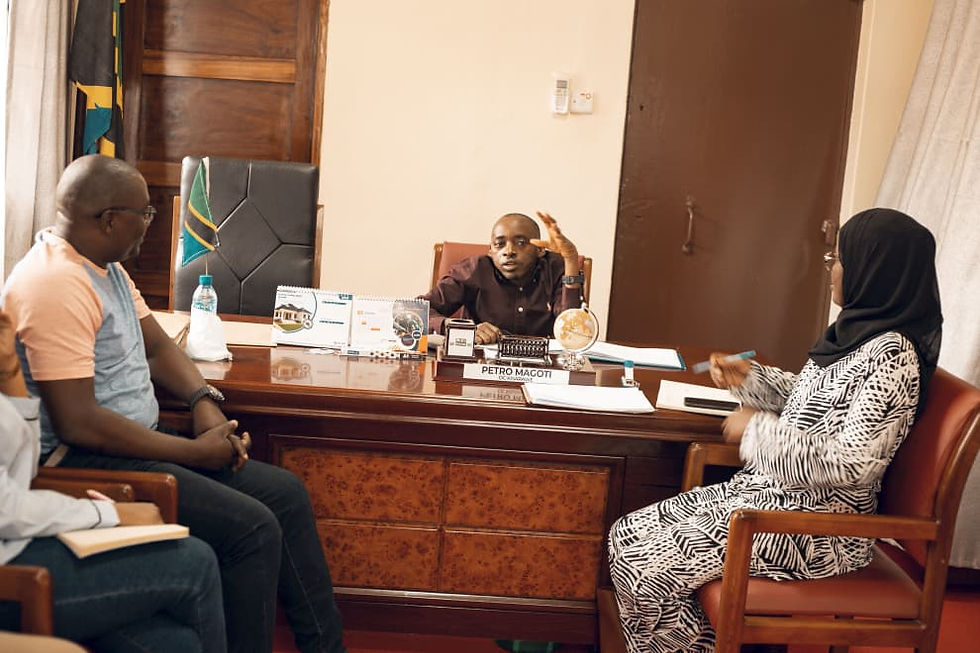Reflections from the Tanzania Mental Health Summit 2025.
- C-Sema Team
- Jun 10, 2025
- 4 min read
Kahama isn't the first place that comes to mind when people talk about national change. But on May 30th and 31st, it became exactly that, a place where something long overdue finally began to shift.
As a child protection and mental health organization, we’ve seen up close how heavy silence can be, how stigma, poverty, violence, and isolation shape young people’s lives long before they walk into a clinic or a counsellor’s office (if they ever do). That’s why this summit mattered and that’s why we showed up.

We weren’t alone. More than 300 people filled the space, mental health professionals, youth leaders, policymakers, advocates, researchers, and community members, each carrying something important. Some brought lived experience. Others brought data, policy insight, or technical skill. But we were all there for the same reason: a shared belief that mental health in Tanzania deserves better and that change can’t wait any longer.
For years, we've known the truth services are scarce, stigma is everywhere, and most people suffer in silence. The Mental Health Policy from 2008 exists, yes, but implementation has been slow and underfunded. So, when the Tanzania Mental Health Summit 2025 was announced, it presented an opportunity to pause, to listen, and to imagine something better together.
The summit opened with a keynote that connected mental health to the Sustainable Development Goals (SDGs). Not just in theory, but in practice: How does a student succeed at school if they’re silently battling depression? How can we talk about national productivity when our youth are burned out, anxious, and unemployed?
Government representatives spoke about regulating the mental health profession, a step long overdue, especially with so many unqualified providers filling the gaps.

And then came the numbers. Alarming ones. Depression is rising fast, especially among children. You could feel the room shift. Heads nodded. Eyes narrowed, facing the hard truths can do that to you.
In smaller rooms, the conversations deepened. One session focused on human rights, how mental health isn't a privilege, but something every person deserves access to. CUAMM shared about adolescents living with HIV, and how peer-led support and early screening make a real difference. That is our lived reality.

Young people spoke, not just about their struggles, but their ideas. How innovation, when backed by support can open doors. How stigma breaks down when communities start talking, when care becomes something local and real. A good example is an initiative that C-Sema is spearheading on suicide prevention in collaboration with Lifeline international that focus on providing awareness, and support to both individuals and communities, empowering them to take proactive steps in mental health care. This approach not only helps in preventing suicide but also promotes overall well-being among young people.

On Day 2, the conversation shifted toward possibility. We looked at innovation as technology and as creativity in hard places. Mirembe Hospital shared its telepsychiatry pilot, an effort to reach people where they are. There were honest conversations about workforce shortages, lack of awareness, and how stretched everyone feels at times.
A session that stuck with many of us was about economic empowerment. It was raw. Real. Because the truth is, mental health and poverty are deeply tangled. Many young Tanzanians are anxious not because something is “wrong” with them but because they have no income, no stability, no sense of future.
This is where civil society organizations were called to action, not just to advocate, but to equip. To help young people turn skills into businesses, education into opportunity. When someone can feed themselves, build something of their own, or support their family, it changes how they feel. About life and about themselves.
Mental health support has to look like that, too.
So, what did we leave with?
We didn’t leave with all the answers. But we did leave with clarity and five loud, urgent truths:
Mental health is a development issue
It belongs in every plan and policy that talks about education, health, or growth. It's not an extra addition but an essential need.
We need regulation now
Mental health care must be safe. That means trained providers, ethical standards, and real accountability from all that practice.
Data can’t wait
We can’t plan without knowing what’s happening. We need current, local data to guide our actions.
Youth aren’t just the beneficiaries, they are quite frankly the drivers
Give them space, support their ideas, fund their work. The solutions are already inside them.
Mental health must be everywhere
Not in a silo. Integrated into HIV services, schools, hospitals, communities. It should meet people where they are.
As we packed up our booths and said our goodbyes on the last day, it didn’t feel like the end. It felt like the start of something we all wanted to protect and push forward.
The Tanzania Mental Health Summit 2025 didn’t fix everything. But it reminded us that we are not alone in this fight. That the work is urgent but it’s also possible. That change, real, deep, lasting change can begin with honest conversation and the courage to imagine more.
And maybe just maybe Kahama will be remembered as the place where that courage took root.
Prepared by C-Sema's Communication Team.



